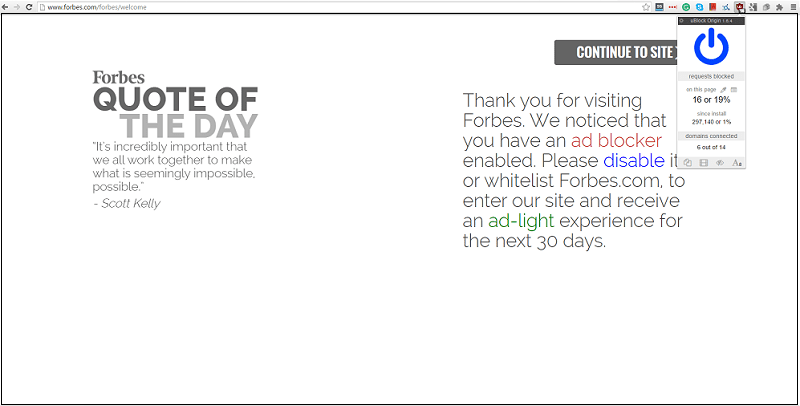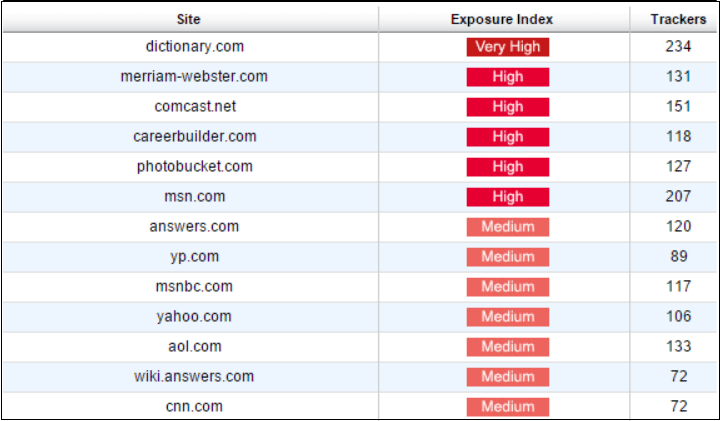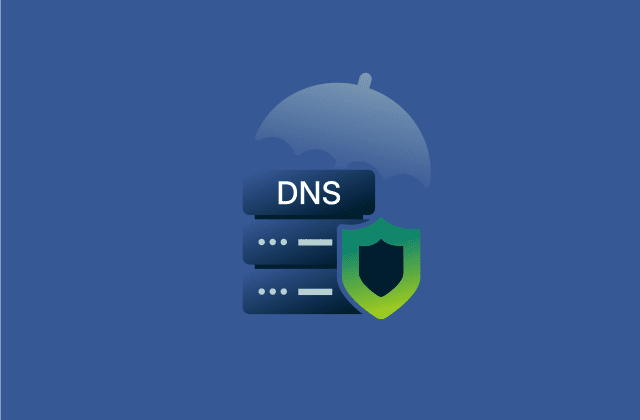
This post was originally published on March 9, 2016.
Last December, Forbes started blocking access to visitors who used ad-blocking software. Visitors with any type of ad blocker installed on their web browser were immediately met with an obtrusive white wall asking them to politely disable their settings in order to view the site.
(In other news, Forbes is serving malware with its mandatory ads.)
But Forbes isn’t the only company taking ads into its own hands. The Washington Post, Slate, and more recently Wired have also dabbled in blocking ad blockers.
There are many irrefutable benefits to using an ad blocker—they help protect you from malware, speed up load times, and offer an all-around better site experience—but there’s also a valid counter argument: How can domain owners make money without ads?
The rise of ad blockers
In 2015 alone, ad blocking software rose a whopping 41 percent, with an estimated 200 million active users worldwide. It's changed from something only a handful of tech-savvy people used to an everyday household tool.
We venture to argue one of the main reasons why more people are installing ad blockers is because they’re becoming increasingly sensitive to how their information is being shared. Targeted ads track your browsing history in order to serve up customized ads, and they’ve regrettably become the status quo.

It’s scary how ads today are so personalized. It’s gotten to the point where they process thousands of bits of data before a website even loads, pulling apart different aspects of your browsing history to create highly personal—and often highly intrusive—ads.
Perhaps this is why so many companies are developing ad-blocking software. (See Apple’s iOS 9 ad blockers and Android’s blockers for proof.)
Why targeted ads are dangerous
In a study conducted by the University of Pennsylvania, 66 percent of Internet users said they were uncomfortable with the thought of targeted advertising. Interestingly, the number grew to 86 percent when they learned how marketers were getting the data to tailor these ads.
Targeted ads expose users' privacy, and the trackers behind these ads are more common than you think.
Take a look at the Wall Street Journal's What They Know series to see just how exposed some websites leave their visitors. (Props to Wikipedia for having 0 trackers installed.)

Taking the internet into their own hands
We get it. Ads generate revenue. The problem, however, is that the public is catching on to how these tailored ads are made and how they expose and pervert people's privacy. Users are changing the way they want to receive information, and sites like Forbes and Wired are greatly underestimating how much people really hate ads.
Browser Media puts it well:
“Users are blocking ads to retaliate against intrusive, irrelevant and often downright dreadful ads in terms of quality – you know the data-sucking ones that take over your screen with auto-play videos and flashing slogans so you struggle to sort the content from the crap. But those ads pay the bills. No money, no website.”
In 2002, only one percent of Internet users were using an ad blocker. Today it's nearly 50 percent.
And yet instead of trying to fix this and protect the privacy and well-being of their visitors, more sites today are forcing readers to willingly disarm themselves in order to view any type of content.
Not a great way to earn the reader's trust, is it?
The ongoing debate over privacy vs. revenue
Unlike other companies, Forbes has been transparent with how their new business system has affected the site’s performance. In a public statement, chief content officer Lewis DVorkin emphasizes how nearly 44 percent, roughly 1.6 million visitors, disabled their ad blockers in order to view the site. “We monetized 15 million ad impressions that would otherwise have been blocked," DVorkin boasts.
Sounds good, right? Not really...
What DVorkin fails to mention is while they monetized 15 million new ad impressions, they actually drove away 56 percent of users who weren’t willing to disable their blockers.
These users may not be coming back anytime soon.
Looking towards the future
As more people start to see the benefits of ad blockers, fewer visitors will be willing to disable them. This is especially true when it comes to mobile devices, where ad blockers are beginning to come pre-installed.
We’re curious to see if sites like Forbes and Wired will continue to block ad blockers, or if they’ll realize it’s a wasted effort and instead focus on changing how these ads are being served.
Our bet is on the latter.
Featured image: Viktor Hanacek/Picjumbo
Take the first step to protect yourself online. Try ExpressVPN risk-free.
Get ExpressVPN




















Comments
I turned off my ad blocking tool for youtube because I wanted to support the content creators For other sites that blocked me I just never visit them again. There is always an alternative
I adore looking at and I conceive this website got some genuinely utilitarian stuff on it!
It's remarkable to visit this web page and reading the views of all colleagues on the topic of this piece of writing, while I am also keen of getting familiarity.